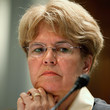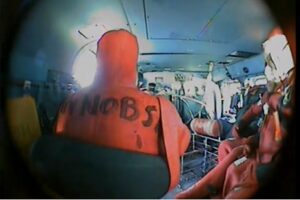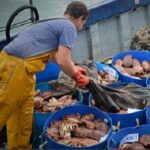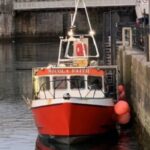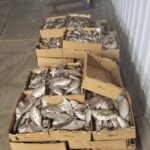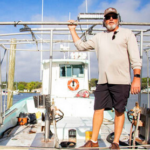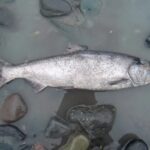Tag Archives: jane-lubchenco-grossly-failed-policies
Gov. gets deaf ear from White House on fisheries as Valerie Jarrett, a senior advisor to President Obama Dummies Up!
![]() Valerie Jarrett, a senior advisor to President Obama, has declined to explain why the White House turned a deaf ear to the pleas of Gov. Deval Patrick for relief from what Patrick told her were “impending drastic cuts” in landings allowed the groundfishing fleet concentrated in his state. continued
Valerie Jarrett, a senior advisor to President Obama, has declined to explain why the White House turned a deaf ear to the pleas of Gov. Deval Patrick for relief from what Patrick told her were “impending drastic cuts” in landings allowed the groundfishing fleet concentrated in his state. continued
BULLARD, SHELLEY, and COD: or Fish Being and Nothingness – Featured Writer Dick Grachek
 “Returning Our New England Fisheries to Profitability”: “You’re doin’ a great job, Brownie” aka, Janie, Johnny, Petey. You should be proud. Mission Accomplished?
“Returning Our New England Fisheries to Profitability”: “You’re doin’ a great job, Brownie” aka, Janie, Johnny, Petey. You should be proud. Mission Accomplished?
In her resignation email Lubchenco made the gravity-defying claim that she had made “notable progress” in “ending overfishing, rebuilding depleted stocks, and returning fishing to profitability”; but soon after, John Bullard “In an interview at the Times, Bullard said the telling figure was that the fleet caught only 54 percent of the allowed catch in 2012, and reasoned from that statistic that there is a dearth of inshore cod, a situation that warrants serious action to reverse.” Richard Gaines March 8, 2013 Gloucester Daily Times, “NOAA head explains stock stand”
Peter Shelley of Conservation Law Foundation explains the Cod Dilemma in a wormy little video he so humorously named “For Cod’s Sake”…..continued
Three years into catch shares, fishing industry faces ‘Day of Reckoning’
![]() NEW BEDFORD — Sharp new cuts in fishing quotas mark the start today of the fourth year of fishing catch shares and sector management in the Northeast, NOAA’s prescription for rebuilding fish stocks and streamlining the fishing industry. But the fishermen who now see their quotas of some fish cut by more than 70 percent, who see their livelihood evaporating before their eyes, who are losing homes to foreclosure, insist, without contradiction, that they have done everything NOAA Fisheries has asked them to do in the past three years, and years before that. sadly, continued
NEW BEDFORD — Sharp new cuts in fishing quotas mark the start today of the fourth year of fishing catch shares and sector management in the Northeast, NOAA’s prescription for rebuilding fish stocks and streamlining the fishing industry. But the fishermen who now see their quotas of some fish cut by more than 70 percent, who see their livelihood evaporating before their eyes, who are losing homes to foreclosure, insist, without contradiction, that they have done everything NOAA Fisheries has asked them to do in the past three years, and years before that. sadly, continued
Gloucester fishing community seeks relief from catch limits – Gloucester’s historic industry. Uncertain future
 A few weeks ago, second-generation commercial fisherman B.G. Brown almost gave up. He had learned how much fish he can legally catch in the coming year. The numbers were shockingly low. “I was ready to throw in the towel,” Brown told a crowd of about 40 local business people, political leaders, concerned community members, and fellow fishermen that gathered last week to discuss the uncertain future of Gloucester’s historic industry. continued
A few weeks ago, second-generation commercial fisherman B.G. Brown almost gave up. He had learned how much fish he can legally catch in the coming year. The numbers were shockingly low. “I was ready to throw in the towel,” Brown told a crowd of about 40 local business people, political leaders, concerned community members, and fellow fishermen that gathered last week to discuss the uncertain future of Gloucester’s historic industry. continued
60 Massachusetts Lawmakers urge Governor Patrick to seek fishing aid from Obama, his personal friend from their Chicago days
![]() A group of more than 60 state lawmakers, including many with districts far from the sea, asked Gov. Deval Patrick Thursday to appeal directly to President Obama, his personal friend from their Chicago days, to grant emergency relief from impending cutbacks in commercial fishery landings widely feared to render the commercial fishing industry “non-viable.”President Obama has kept a stony silence in the face of the growing crisis once he appointed Lubchenco to administer the nation’s oceans and fisheries. And he failed to respond to requests for her dismissal from Reps. Barney Frank, John Tierney, Walter Jones and Sen. Scott Brown. Frank, now retired, and Tierney, whose district includes Gloucester, are Democrats. Jones, who represents the Outer Banks of North Carolina, and Brown, defeated last November by Democrat Elizabeth Warren, are Republicans. continued
A group of more than 60 state lawmakers, including many with districts far from the sea, asked Gov. Deval Patrick Thursday to appeal directly to President Obama, his personal friend from their Chicago days, to grant emergency relief from impending cutbacks in commercial fishery landings widely feared to render the commercial fishing industry “non-viable.”President Obama has kept a stony silence in the face of the growing crisis once he appointed Lubchenco to administer the nation’s oceans and fisheries. And he failed to respond to requests for her dismissal from Reps. Barney Frank, John Tierney, Walter Jones and Sen. Scott Brown. Frank, now retired, and Tierney, whose district includes Gloucester, are Democrats. Jones, who represents the Outer Banks of North Carolina, and Brown, defeated last November by Democrat Elizabeth Warren, are Republicans. continued
Editorial: Division of Marine Fisheries chief Paul Diodati’s stand shows catch shares killing fishery
Noting that he shares the concerns of the relatively few state-permitted, small-boat fishermen, he made it clear that the shortage of fish within those fishermen’s usual grounds is due in large part to the fact that more and more big boats —![]() “unencumbered by trip limits …particularly on Gulf of Maine Cod when they are aggregated for migration, feeding (and) spawning, has significantly contributed to declines in local abundance.” Read more
“unencumbered by trip limits …particularly on Gulf of Maine Cod when they are aggregated for migration, feeding (and) spawning, has significantly contributed to declines in local abundance.” Read more
My View: Science, sense needed in fishing’s ‘human crisis’ – Scott W. Lang
 The human crisis in the groundfishing industry is a real crisis. It is not contrived, it is not looming, it is not a threat, it is here.
The human crisis in the groundfishing industry is a real crisis. It is not contrived, it is not looming, it is not a threat, it is here.
Jesus Christ! Not Cape Pond Ice. Cape Pond Ice on the block
 Scott Memhard cited the decision by NOAA against allowing the industry a second year of relief via interim catch levels as forcing his hand. The first year of interim limits held the reduction in Gulf of Maine cod to only 22 percent but without the same for the 2013 fishing year beginning May 1, landings will be compressed by 77 percent. And with $1 million in debt coming due, Memhard said he has little choice. Read more
Scott Memhard cited the decision by NOAA against allowing the industry a second year of relief via interim catch levels as forcing his hand. The first year of interim limits held the reduction in Gulf of Maine cod to only 22 percent but without the same for the 2013 fishing year beginning May 1, landings will be compressed by 77 percent. And with $1 million in debt coming due, Memhard said he has little choice. Read more
Catch shares tied to cod losses – State fisheries chief cites lack of controls under NOAA system
![]() The 2010 catch share commodification of the Northeast groundfishery, hailed by advocates including NOAA Administrator Jane Lubchenco as a sure path to restoring overfished stocks and profitability for the fleet, has had the opposite effect on Gulf of Maine cod, according to the state’s director of marine fisheries.
The 2010 catch share commodification of the Northeast groundfishery, hailed by advocates including NOAA Administrator Jane Lubchenco as a sure path to restoring overfished stocks and profitability for the fleet, has had the opposite effect on Gulf of Maine cod, according to the state’s director of marine fisheries.
The habit of bigger offshore boats to accumulate catch shares in Gulf of Maine cod and capitalize on pulses of the cod with landings far larger than 800 pounds has “significantly contributed to declines in local abundance” of the essential fish for the day boats, state fisheries chief Paul Diodati said in a memo sent Feb. 5 to the Marine Fisheries Advisory Commission and obtained by the Times. Read more here
Fishermen look to White House – John Bullard, NOAA’s Northeast regional administrator based at Gloucester’s Blackburn Industrial Park, scoffed at that idea.
By default and past experience, what slim hope remains to relieve the declared federal fisheries disaster before it consumes the surviving core of the groundfishing fleet in Gloucester and other New England ports has shifted from le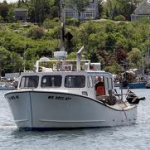 adership at the Commerce Department to the White House. ”I have not heard one word about fisheries from the president,”said Paul “Sasquatch” Cohan, the Gloucester fisherman who announced at the Warren meeting in Gloucester that he had nothing left to fight with. “I wouldn’t give up, but now I have to give up,” said Cohan, who operated a gillnet day boat. Read more
adership at the Commerce Department to the White House. ”I have not heard one word about fisheries from the president,”said Paul “Sasquatch” Cohan, the Gloucester fisherman who announced at the Warren meeting in Gloucester that he had nothing left to fight with. “I wouldn’t give up, but now I have to give up,” said Cohan, who operated a gillnet day boat. Read more
Senator Warren hears the fears of a community poised to lose it all, the fishing community
 An airing of grievances and an airing of fears rained down on U.S. Sen. Elizabeth Warren Tuesday in her first meeting with the fishing community since she took office last month. The grievances were those of business people, descendants of the nation’s earliest industry, who in one form of another had made their way harvesting the sea, but now find themselves trapped by government edicts and policy said to be posing as biology, according to Vito Giacalone, the local port’s best known and connected leader. Read more
An airing of grievances and an airing of fears rained down on U.S. Sen. Elizabeth Warren Tuesday in her first meeting with the fishing community since she took office last month. The grievances were those of business people, descendants of the nation’s earliest industry, who in one form of another had made their way harvesting the sea, but now find themselves trapped by government edicts and policy said to be posing as biology, according to Vito Giacalone, the local port’s best known and connected leader. Read more
As Fisheries Struggle, Debate Heats Up Over How to Help
![]() Russell Sherman stood at the wheel of his boat, the Lady Jane, as light faded and his crew prepared to dock for the night. He made $19,800 fishing last year, he said, and at 64 is afraid he will go into foreclosure. “People are on the hook for money, and they’re not going to be able to pay it off,” said Mr. Sherman, who is a founding member of the Northeast Seafood Coalition, an industry group that supports fishermen and has pushed against deep cuts to the industry. “Desperate situation.” Sadly, Read more here
Russell Sherman stood at the wheel of his boat, the Lady Jane, as light faded and his crew prepared to dock for the night. He made $19,800 fishing last year, he said, and at 64 is afraid he will go into foreclosure. “People are on the hook for money, and they’re not going to be able to pay it off,” said Mr. Sherman, who is a founding member of the Northeast Seafood Coalition, an industry group that supports fishermen and has pushed against deep cuts to the industry. “Desperate situation.” Sadly, Read more here
Editorial: Fed lawmakers must look beyond boat monitor costs
 As lawmakers step up the pressure to secure NOAA funding for the failing monitors’ program, it’s also important that they not lose sight of a far bigger picture as the new Congress takes its early steps forward regarding ocean policy. Read more here
As lawmakers step up the pressure to secure NOAA funding for the failing monitors’ program, it’s also important that they not lose sight of a far bigger picture as the new Congress takes its early steps forward regarding ocean policy. Read more here
One fisherman’s tale shows plight of many -Richard Gaines – gloucester daily times
For a gillnet fisherman, these are trying times — with worse yet to come. Captain Don Smith, a 57-year-old transplanted Mainer whose family roots are in Nova Scotia and has fished commercially from Gloucester for more than 30 y ears, doesn’t need to be prodded to speak to that…… Making life more difficult for the small boats are the big boats; these “trip” boats that traditionally worked offshore on the more distant Georges Bank. But the catch share trading system imposed by federal regulators in 2010 has liberated them to acquire quota from non-participants or day boats, and — no longer limited by daily catch limits —they have been induced to chase the pulses of cod onto Stellwagen, where they flaunt their scale and have their way. Read more here
ears, doesn’t need to be prodded to speak to that…… Making life more difficult for the small boats are the big boats; these “trip” boats that traditionally worked offshore on the more distant Georges Bank. But the catch share trading system imposed by federal regulators in 2010 has liberated them to acquire quota from non-participants or day boats, and — no longer limited by daily catch limits —they have been induced to chase the pulses of cod onto Stellwagen, where they flaunt their scale and have their way. Read more here
Editorial: Lawmakers must force NOAA’s hand on fisheries
 Yes, NOAA can show “scientific” data suggesting that these dire cuts — up to 77 percent for the Gulf of Maine cod catch – may be necessary. Yet, NOAA also had 2008 survey data that showed many of the cod stocks were already rebuilt. And remember that the latest data is off an assessment model that did not include any input from rank-and-file fishermen, meaning it’s no more credible than the admittedly bogus data used in the “Trawlgate” fiasco of 1999-2000, when NOAA conceded its statistics were hopelessly flawed, yet still used them to set stock limits. Read more
Yes, NOAA can show “scientific” data suggesting that these dire cuts — up to 77 percent for the Gulf of Maine cod catch – may be necessary. Yet, NOAA also had 2008 survey data that showed many of the cod stocks were already rebuilt. And remember that the latest data is off an assessment model that did not include any input from rank-and-file fishermen, meaning it’s no more credible than the admittedly bogus data used in the “Trawlgate” fiasco of 1999-2000, when NOAA conceded its statistics were hopelessly flawed, yet still used them to set stock limits. Read more
Officials Back Deep Cuts in Atlantic Cod Harvest to Save Industry –
New York Times “I do not deny the costs that are going to be paid by fishermen, families, communities. They are real. They will hurt.” The problem, he said, is not government inflexibility, as fishermen have suggested, but the lack of fish. “It’s midnig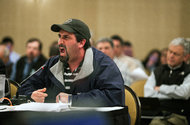 ht and getting darker when it comes to how many cod there are,” he said. “There isn’t enough cod for people to make a decent living.” But opponents said the limits would not help save the industry.
ht and getting darker when it comes to how many cod there are,” he said. “There isn’t enough cod for people to make a decent living.” But opponents said the limits would not help save the industry.
“Right now what we’ve got is a plan that guarantees the fishermen’s extinction and does nothing to ameliorate it,” David Goethel, a New Hampshire-based fisherman and biologist, said as he cast his vote against the plan.
Fishermen were furious with the result.“I’m leaving here in a coffin,” said Carlos Rafael, who owns a commercial fishing business in New Bedford, Mass. “With all these cuts, I won’t be able to keep half of my fleet working. I’ll have to cut down from 20 groundfish boats to maybe 5or 6.” Read more
New England panel approves 2013 cod limits with 77 percent cut
The New England Fishery Management Council voted Wednesday night to cut the Gulf of Maine cod fishery limits by 77 percent for the 2013 fishing cycle and to extend similar cuts for the 2014 and 2015, dealing a dire blow to the region’s fishing industry. Why this should be so became a sub-theme of the day, with the phrase “regime shift” used frequently to suggest a braid of environmental and ecological alterations —including millions of lobster traps that take an unknown quantity of cod as by-catch, large volumes of herring which eat cod eggs and seals which feed on cod, as well as the various forms of global warming that emanate from and absorb into the seas. Read more
Editorial: Fed lawmakers miss key point on fishery ‘disaster’
That’s the fact that, while Superstorm Sandy brought unforeseen cleanup costs, the economic disaster recognized by the aptly named Blank and her Commerce and NOAA colleagues wasn’t unforeseen at all. And despite claims to the contrary in her own disaster declaration, it is not merely a case of declining stocks and other natural factors. Read more
House plan guts aid for fisheries
Two newly released U.S. House Rules Committee amendments combine to roughly match the Senate appropriation totaling $60 billion for Superstorm Sandy relief, but virtually eliminate the $150 million for fisheries disaster aid a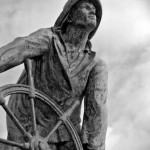 imed at providing relief to the Northeast groundfishery, including fishermen working out of Gloucester. One amendment for $17 billion, filed by Rep. Hal Rogers, a Kentucky Republican and chairman of the House Appropriations Committee, contains no money for the fisheries disasters of Massachusetts, four other New England states and New York, as well as Mississippi’s oyster fishery and Alaska’s Chinook salmon fishery. Read more
imed at providing relief to the Northeast groundfishery, including fishermen working out of Gloucester. One amendment for $17 billion, filed by Rep. Hal Rogers, a Kentucky Republican and chairman of the House Appropriations Committee, contains no money for the fisheries disasters of Massachusetts, four other New England states and New York, as well as Mississippi’s oyster fishery and Alaska’s Chinook salmon fishery. Read more
Closed Areas need fed’s OK to open
 The New England Fishery Management Council has voted to recommend giving commercial groundfishermen access to parts of five areas that have been closed to them for many years. The request to open closed areas to commercial fishing came days before the NOAA Science Center issued a report on the 2011 fishing year that contained the revelation that only 41 percent of allocated fish were landed in 2011. Read More
The New England Fishery Management Council has voted to recommend giving commercial groundfishermen access to parts of five areas that have been closed to them for many years. The request to open closed areas to commercial fishing came days before the NOAA Science Center issued a report on the 2011 fishing year that contained the revelation that only 41 percent of allocated fish were landed in 2011. Read More
Your View: Fishery council must reject unreliable assessments – By Richard Canastra – southcoasttoday
I nearly always attend New England Fishery Management Council meetings in person, but last month, I was unable to attend the meeting in Newport, and instead listened to the proceedings online. I found that listening, and not physically being there, gives you a different perspective on a meeting. You hear more intently. There are fewer distractions. Examples seem clearer. Patterns emerge. There are some predictable patterns in life. When there is an accident, at the end of the traffic jam you find a police officer. When you go to a restaurant, at the end of dinner the bill comes. And when you attend a fisheries management council meeting that is dealing with a crisis, there is usually a bad stock assessment.
Bad stock assessments have become as predictable as the sunrise. Read More
Share and Share Alike
As a citizen advocate of the fishing industry, I have no confidence in NOAA stock assessments.
I spend a lot of time reviewing material, attempting to convey the results to as many people possible.
These listening sessions allow, as Mr Canastra stated, patterns to emerge.
The patter of Bill Karp, and Sam Rauch deviates not from the typical bureaucratic structure, much to my disappointment after listening to them from various venues, and reading a lot of information.
The revelations of the Georges Bank Yellowtail Flounder Working Group Meeting May 23, 2012, are the foundation of my opinion to condemn the stock assessments as a tool for fishery management, while enforcing Mr Canastras belief that the proper equipment is not being utilized to sample yellow tail flounder abundance.
As stated, patterns have emerged. The pattern of over looking details that have detrimental affects on stock assessments and confidence in them.
At the The New England Fishery Management Council’s three-day meeting in Plymouth Ma on 9/25/2012, a major detail confirmed the retrospective patter of no confidence in stock assessments conducted by NOAA.
During the 54th Stock Assessment Workshop (SAW)/Stock Assessment Review Committee (SARC) Meetings, a fisherman asked a question that received a hollow shrug of the shoulders answer that I find alarming, and telling that these assessments are substandard and incomplete.
The question was, “why is there no mention of herring as a predator species” in the ground fish assessment?
The answer. ” The SSC was, ah, not presented, ah, ah herring as a, ah, predator species….”
Yes. A Retrospective Pattern of the science used to mismanage this industry is established.
No confidence.






 Recently retired Congressman Barney Frank said Thursday he would “absolutely” be willing to go to the White House as an advisor to and friend of Sen. Elizabeth Warren to seek President Obama’s support for executive orders and congressional appropriations to relieve the Northeast groundfishery disaster.
Recently retired Congressman Barney Frank said Thursday he would “absolutely” be willing to go to the White House as an advisor to and friend of Sen. Elizabeth Warren to seek President Obama’s support for executive orders and congressional appropriations to relieve the Northeast groundfishery disaster. id in 2012. And as reported by Richard Gaines of The Gloucester Times, two independent analysts, from the Northeast Seafood Coalition and the School of Marine Science and Technology at University of Massachusetts-Dartmouth, noted troubling behavior of the data in NOAA’s report.
id in 2012. And as reported by Richard Gaines of The Gloucester Times, two independent analysts, from the Northeast Seafood Coalition and the School of Marine Science and Technology at University of Massachusetts-Dartmouth, noted troubling behavior of the data in NOAA’s report. ![environmental-watchdog[1]](https://fisherynation.com/wp-content/uploads/2012/09/environmental-watchdog1.jpg)
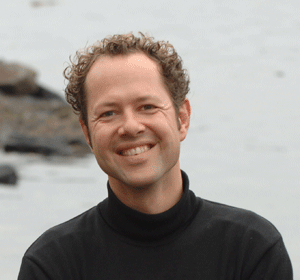 Brought to us, of course, by the Walton Foundation, EDF and Dr. Lubchenco as a reason to shift fisheries to catch share management immediately? A National Academy of Sciences study – Recurrent jellyfish blooms are a consequence of global oscillations – refutes that (now there’s a surprise!) contention.
Brought to us, of course, by the Walton Foundation, EDF and Dr. Lubchenco as a reason to shift fisheries to catch share management immediately? A National Academy of Sciences study – Recurrent jellyfish blooms are a consequence of global oscillations – refutes that (now there’s a surprise!) contention.  SEAFOOD.COM NEWS by John Sackton (Editorial Comment) – June 15, 2011 A
SEAFOOD.COM NEWS by John Sackton (Editorial Comment) – June 15, 2011 A